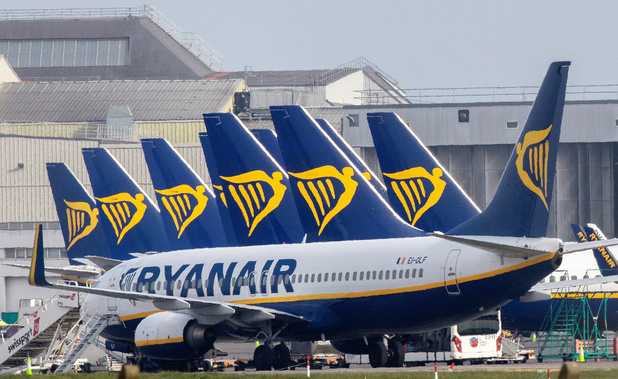The entire Ryanair fleet based at Zaventem and Charleroi airports has been grounded by a three-day strike launched on Friday by the airline’s pilots and cabin crews.
However, fewer than 2% of the 3,000 Ryanair flights scheduled for European destinations were affected by the strike on its first day, the low-cost Irish carrier said on Friday. It added that the unions’ actions in Belgium were limited mainly to “minor” disruptions and over 60% of Ryanair flights to and from Charleroi and Zaventem were in the air.
“This just goes to show that 60% of flights are done daily by crews and planes based outside Belgium,” countered CNE Permanent Secretary Didier Lebbe.
Ryanair’s Michael O’Leary had, in fact, noted that Belgium is “a small part of our global business” and that most of the carrier’s planes were not based there.
A total of 17 Ryanair planes are based in Belgium: 4 at Zaventem and 13 at Charleroi. Staff in Belgium responded strongly to the strike call, grounding 100% of these planes in “one of the most profitable countries on the Ryanair network,” CNE’s Lebbe said.
Silvia, a Spanish CNE delegate, said Ryanair “preferred to leave 30,000 people in Belgium without flights rather than comply with Belgian law.” She hoped the message from staff would be heard by Belgium’s government.
Related News
- Over 180 Ryanair flights cancelled due to cabin crew strikes
- Ryanair pilots to strike next weekend; flights cancelled
According to Lebbe, Ryanair pilots in Belgium are strongly motivated and could, moreover, coordinate with colleagues in the rest of Europe if nothing changes.
Ryanair staff in France were scheduled to go on strike on Saturday and Sunday, sparking a spate of cancellations. British cabin crews have just voted in favour of a strike, which could be launched in August, while unions representing the airline’s staff in Romania and Czech Republic have approached their federations in connection with the current strike movement, according to the CNE permanent secretary.
“We are awaiting the company’s action after our trade union action,” Didier Lebbe said. “We shall also analyse the strike.”

